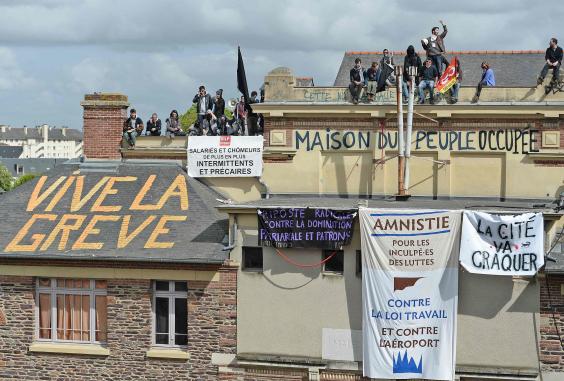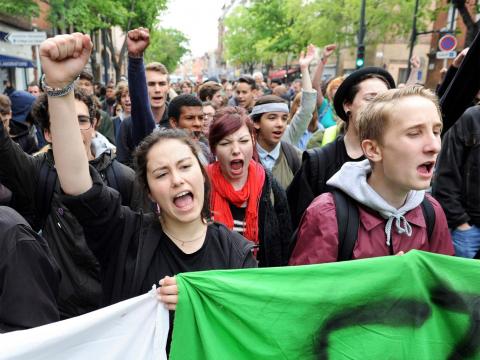French Government Forced to Use Emergency Powers to Push Through Labour Law Changes
The French government has resorted to its emergency powers to impose changes in employment law which have provoked violent protest in recent days.
In a stinging reverse for President François Hollande a year before elections, the government failed to persuade a blocking minority of its own Socialist deputies to support plans to simplify and loosen France’s complex rules on hiring and firing.
Defying increasingly angry street protests by militant unions and students, the government moved to by-pass a parliamentary vote and impose the changes by decree in the next few days.
The Prime Minister Manuel Valls told parliament – to scattered boos and heckling – that he had been authorised by a cabinet meeting to use clause 49.3 of the constitution to “engage the government’s responsibility” and push through the changes. Unless the government loses a confidence vote – which seems unlikely – the reforms will become law.
“The country must move forward,” Mr Valls said. A “balanced and coherent reform, intended to encourage employers to create jobs, “must be seen through to the end.”
The government had compromised on its original proposals, he pointed out, to the satisfaction of more “reformist” unions. Nevertheless, at least 40 government deputies were threatening to block the changes.
This is the second time in two years that the Valls government has been forced to use emergency powers to push through market-friendly reforms against the wishes of part of the Socialist parliamentary party.

Despite substantial concessions made to moderate unions, the changes are the first serious attempt by any recent administration to lighten the regulatory obstacles to job creation in France. The centre-left government insists that less rigid labour laws are in the best interests of young people and the country’s 3,500,000 jobless.
The right-wing opposition dismisses the changes as an “empty shell” – although the proposals go beyond anything attempted by the former president, Nicolas Sarkozy.
The reforms will make it easier for employers to terminate long-term contracts when their businesses are struggling. They will permit local agreements between employers and workers to modify the 35 hour working week and other labour regulations.
Hard line union federations say the changes would, in effect, end the principle of a single nationwide body of legal protections for workers. Unions representing only 30 per cent of workers in one factory or office could call for a referendum to approve or reject a local agreement to set aside regulations including some aspects of the 35 hour week.
====
Nuit Debout Goes Global
May 9, 2016 - Social Network
The French protest movement “Nuit Debout” (Up All Night) plans to go international, urging people around Europe and the world to take to the streets to protest austerity, among many other grievances, on May 15.
In the photo: A woman faces French anti riot policemen as they block the access to the Place de la Republique after protesters taking part in the Nuit Debout (Up All Night) movement in Paris, on May 1, 2016.
The French protest movement “Nuit Debout” (Up All Night) plans to go international, urging people around Europe and the world to take to the streets to protest austerity, among many other grievances, on May 15.
The call for a “global day of action” was published on the movement’s social networks’ pages on Facebook and Twitter under the hashtag #GlobalDebout.
“We call on people’s movements across the world to mobilize for justice and real democracy on the weekend of May 15, 2016 for a #GLOBALDEBOUT,” the event’s descriptions states.
The aim of the global movement would be to arrange local “autonomous” protests linked by an issue that is urgent for the region, be it austerity, low wages or jobs. An international meeting with activists from around Europe was held at Paris’ Place de la Republique on Saturday, which called to share experience “in order to build a common struggle in Europe.”
It’s only been a couple of months since the youth-led movement Nuit Debout started, but some of the protests have been turbulent: in April, more than 20 demonstrators were injured in Rennes, and police used tear gas to disperse the protests all over the country.
Thousands gathered all over France on April 9, and the movement drew comparison with the Occupy demonstrations in the US.
The protests have taken place in Paris, Marseille, Rouen, Rennes, Toulouse, and other cities.
The movement’s Facebook page has got over 50,000 “likes” in less than 10 days. Currently, the page has over 130,000 followers.
It all started on March 31, after some 400,000 people marched in several cities across France to protest the proposed labor reform that would make it easier for employers to fire workers. Since then it grew into wider anti-government protests, with demonstrators expressing their grievances over a wide range of issues.
Sourced through Scoop.it from: www.rt.com


Spread the word